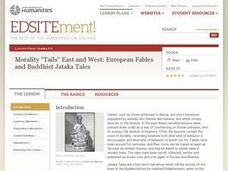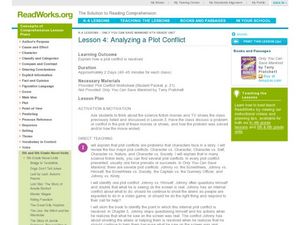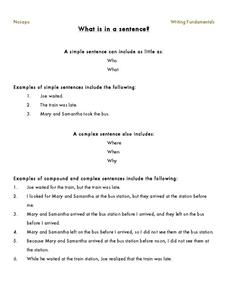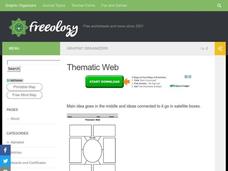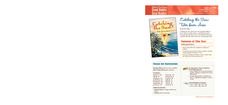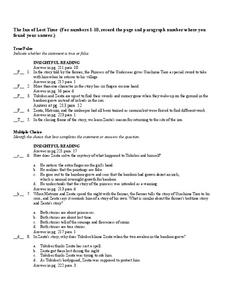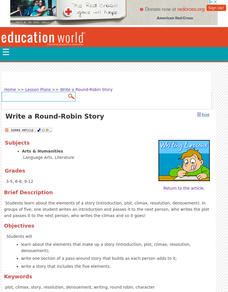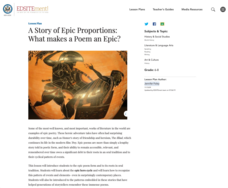Curated OER
Analyzing Story Elements
Lesson ideas to teach students how to analyze story elements through visual representation.
Curated OER
Story Structure Slide Show
Analyzing the sequence of actions in dramatic stories leads to deeper comprehension of story structure. The class identifies the main actions in each section of a story and develops frozen tableau's for the identified actions of the...
Curated OER
Story Elements
Sixth graders use several pieces of literature to identify specific story elements. In this story elements lesson, 6th graders analyze the story element of character, character traits, and setting for the example stories. Students work...
Curated OER
The News Behind the Story
What a fun way to analyze plot, setting, and character. Learners review story elements, read a short fictional story, then turn the events of that story into a headlining news paper article. Not only does this lesson engage critical...
British Council
Learning English through Short Stories
Use short stories to teach English? Yes! Designed as a professional development opportunity for English language teachers, the ideas in this booklet can easily be adapted to advanced ESL/ELL classes.
Curated OER
Morality "Tails" East and West: European Fables and Buddhist Jataka Tales
Have your class explore Buddhist Jataka Tales to compare and contrast them to European fables. After defining fables, Jataka tales, and the elements of each, learners identify themes and patterns for both types of narratives and the...
Waunakee Community School District
Identifying Themes in Literature
If your language arts learners have a hard time determining the universal theme of a written work, use a straightforward learning exercise to help them find it. After reviewing a list of common themes, kids note the title, character,...
E Reading Worksheets
Climax, Structure, and Elements of a Story
Appropriate for any short story, this worksheet asks readers to identify key elements and then analyze the structure of a short story.
Curated OER
Analyzing a Plot Conflict
Sixth graders analyze plot conflict with science fiction and TV programs. After discussing the conflict, they identify solutions for the programs selected. They examine Only You Can Save Mankind for conflict, and consider ways the...
Syracuse City School District
Literary Elements
Address the literary elements in a piece of writing using these materials. The packet includes plenty of resources, and focuses mainly on theme, character, and point of view, with some materials for setting, symbolism, and author's...
Curated OER
Understanding Fantasy
Explore fantasy as a genre. After working in small groups to identify literary elements in The Lion, the Witch, and the Wardrobe by C.S. Lewis, class members share their work and then use the presentations to help them prepare to write...
Keys to Literacy
Story Map
Recording the key elements of a story (title, setting, characters, problem, ending) on a story map graphic organizer provides primary readers a chance to practice identifying these elements and promotes reading comprehension. The...
Scholastic
Tell Us a Tale: Teaching Students to Be Storytellers
Encourage scholars to retell their favorite short story or folktale, adding personal details to make it their own. After reading their book of choice several times, story tellers retell a tale verbally to their classmates.
Nosapo
What Is in a Sentence, Paragraph, and Story?
Language arts is made up of many parts. Learners review the parts of a sentence, as well as how to make a simple sentence into a complex sentence, before examining full paragraphs and identifying the topic, body, and concluding sentence...
Curated OER
Mini-Lesson Planning for Inferences
Making inferences and drawing conclusions is a key component to successful active reading. Encourage your class to use context clues and prior knowledge to infer different elements of a story, including the setting, plot, and character...
Curated OER
Thematic Web
In this thematic web activity, students complete a graphic organizer with the main idea of the story in the center. Students then identify supporting details and write them in the boxes around the center.
Emotional & Behavioral Disorders and Learning Disabilities
Narrative Story Elements Matrix
Readers use a story elements matrix to identify the title, setting, characters, point of view, problem, and solution in four narratives. The template could be used to prepare for a compare/contrast exercise.
Pearson
Catching the Sun: Tales from Asia
Explore the folklore of Asia and the South Pacific with this language arts instructional activity series. Complementing a reading of Catching the Sun: Tales from Asia by Jan M. Mike, this resource supports learners with understanding...
Curated OER
Genre Lesson: Short Story
Stories from Sandra Cisneros' The House on Mango Street provide sixth graders with an opporltunity to identify the elements of a short story. After several modeling exercises, readers use the provided worksheet to recording information...
Wordpress
The Inn of Lost Time
Test understanding of "The Inn of Lost Time" by Lensey Namoika with an assessment that includes true/false, multiple choice, vocabulary, short answer, and essay questions. The test is not entirely traditional since, for the first 10...
Curated OER
Write a Round-Robin Story
Students discover the elements of a story (introduction, plot, climax, resolution, denouement). In groups of five, one student writes an introduction and passes it to the next person, who writes the plot and passes it to the next person,...
National Endowment for the Humanities
A Story of Epic Proportions: What Makes a Poem an Epic?
Learners analyze the epic poem form and its roots in oral tradition. In this epic poetry lesson, students research the epic hero cycle and recognize the pattern of events and elements. Learners analyze the patterns embedded in the stories.
Curated OER
Building a Literature Pyramid
Students create a literature pyramid. They review and discuss their assessment task and rubric and select the literature for their pyramid. They read the literary selection and complete a pyramid sheet for one of the four literary...
Curated OER
Identifying the Theme in a Story
Students recognize Theme through the use of simple, short stories. Using Pro Quest, students begin by researching the literary element, theme, and how it can be identified. They then identify the themes in Aesop's Fables and other short...







